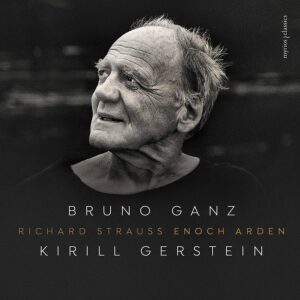Monodramas are tricky to pull off. The text has to be very good and the music has to be better still, to fulfill its dual duty of underscoring the drama and offering enough interest on its own, when it does pipe up. The results vary: from the rare best, like the ingenious masterpiece that is Viktor Ullmann’s Die Weise von Liebe und Tod des Cornets Christoph Rilke, to the tawdry and banal, like Liza Lehmann’s The Happy Prince (based on one of Oscar Wilde’s lesser efforts). One of the few gems that works quite well is Richard Strauss’ Enoch Arden on Alfred Lord Tennyson’s ballad by that name.
When Swiss actor Bruno Ganz–known in the German-speaking world from his work on the stage and internationally for his roles in Wings of Desire and, overwhelmingly, as Hitler–and Kirill Gerstein performed Enoch Arden at Vienna’s Konzerthaus in late 2014, it was a quiet high-point of the season. In just under an hour, Ganz and Gerstein cast the whole world of Enoch’s life and tribulations before the listener’s imagination. Quietly, subtly, steadily, they built this drama, brick by brick, until everyone in attendance found themselves spellbound by the simple and very touching story of friendship, hardship, loss, love, and sacrifice.
In their studio recording, made shortly after their series of concerts, all of that comes across powerfully. A dirty little secret is that most singers are surprisingly poor recitalists. Dieskau was fêted but really not that great; Quasthoff is worse; Vickers hardly ideal. Ganz is an actor and gets it. He doesn’t have to underact to avoid all artifice or the appearance of ever trying too hard. Granitic, gray, grizzled, Ganz makes it an old man’s retrospective: rough as the rocks on the harbor, with gentility well beneath the grave exterior. Quite different from the lyrical, brighter Patrick Stewart.
And when Ganz gets to the story’s end, accompanied by a few very simple and deadly effective chords of Strauss’, it’s hard to hold the tears back. That’s also thanks to Gerstein, who takes his part seriously rather than treating it as second-rate Strauss. That makes this the go-to Enoch Arden–in German. Since the narration is essential, non-German speakers will continue to turn to the terrific, sparse version with Glenn Gould and Claude Rains, which is still available, as is Emanuel Ax’s more lyrical take with the aforementioned Patrick Stewart.
































